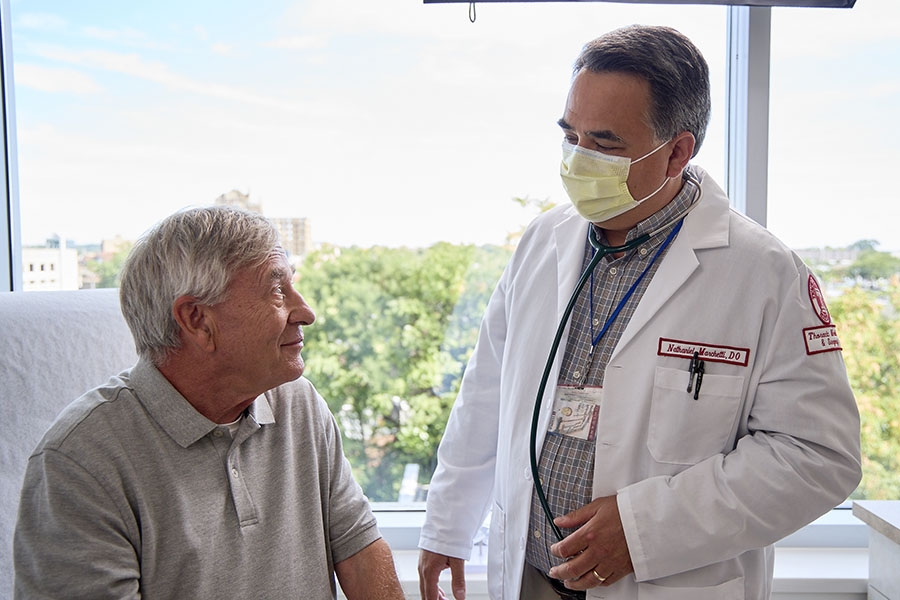Long-term survival is significantly better from a living donor kidney. And kidneys from living donors generally begin functioning immediately after being transplanted.
When my patients decide to pursue the living donor option, most are looking for advice on where to start. They want to know whom to ask and how to begin a conversation of this magnitude. I tell them that it’s never easy.
There are some strategies, however, that can make the ask feel more comfortable — and potentially improve their chances of finding a willing donor. Here are some of the things I advise.
1. Be an advocate for yourself and the process.
It can be helpful to think of yourself as someone whose job is to start the conversation about living-kidney donation, rather than someone who is asking for a kidney. Spreading awareness about your situation — and the situations of others with kidney disease who need a transplant — can spark a natural sense of empathy and interest that encourages people to want to help.
Try to strike a balance between being informative and advocating for yourself. People hearing your story about the need for a kidney will likely be moved, but they may also need time to process the information and to decide how they feel about potentially being a living donor.
For example, you might say something like this to start the discussion: “You may not know this, but I’m in kidney failure and on the transplant list for a kidney. The only cure for this disease is a new kidney. It can take many years to get a kidney from a deceased donor. But it’s also possible for a living person to donate a kidney to me, and that can happen much more quickly.”
2. Make it personal.
Many people don’t realize what life with kidney disease is like, so share what the journey is like for you. Talk about what a typical day or week might encompass, including what it’s like to be on dialysis. Be open about how you feel physically and what kinds of challenges you experience. Sharing this very personal information will encourage people who are considering being a donor to ask more questions about kidney disease and the living donation process.
For example, you might say something like this to someone who doesn’t know what your life is like: “Because I’m in kidney failure, I need dialysis treatment several times a week at a dialysis center, and each session lasts several hours. The treatments are hard; sometimes they give me headaches or make me vomit. But I must have dialysis for the rest of my life unless I can get a new kidney.”
3. Focus on the facts.
Give people a sense of the bigger picture of a kidney transplant. Mention key facts, including how more than 100,000 people are currently on the national waitlist for a kidney, and that transplants from living donors tend to last longer and function better.
When I tell patients about the benefits of living donations, one of their key concerns is what the process is like for a donor. I reassure them that potential donors are thoroughly evaluated to help ensure that they’re healthy enough to withstand the donation process. I also tell them that most donor surgeries are minimally invasive in nature, and the recovery time is usually two weeks.
Another question that I am always asked is, “Who pays for the donor’s surgery?” Patients are relieved to learn that their own insurance typically covers the costs of their donor’s care.
All of this is important information to share with potential donors.
For example, you might say something like this to people who show interest in being a living donor: “You may have a lot of questions about donating a kidney. It’s a big decision. But I am happy to share some information with you, like who can be a donor, what the surgery is like for the donor and who pays for the surgery.”
4. Start with your inner circle when considering donors, but don't be afraid to branch out.
Many patients feel more comfortable talking first with family members and friends about donating a kidney. But it’s always a good idea to expand your pool of potential donors.
- Craft a thoughtful post (complete with pictures of yourself) that can be shared on social media.
- Tell your story to co-workers, in your place of worship, or through other community groups.
The more people who learn about your need for a kidney, the greater your chances of finding a donor match. Sometimes my patients have found a donor where they have least expected it.
I also always stress that everyone who is waiting for a kidney should talk about how there is always a need for organ donors and that people who are interested in being a donor should specify that on their driver’s license.
For example, you might start a conversation with an acquaintance by saying something like: “You may not know this, but I’m on the waiting list for a kidney. Since I have kidney failure, a new kidney is the only cure for my condition. There are 100,000 people like me who are waiting for kidneys.I’m glad to talk about what it means to be a living kidney donor, if you’re interested."
5. Manage your expectations.
Remember that becoming a living donor is a complex decision that people have to make for themselves. If you don’t get the response you want when you ask for a kidney, try not to take it personally. Most importantly, don’t give up. Keep telling your story — and believe that you’re doing everything you can to move forward with a healthier life.
Take the next step
Our experts on the Kidney Transplant Program team at Temple Health provide comprehensive care and support for each patient waiting for a kidney.
Learn more about the kidney-donation process at Temple, including how to become a living donor. To schedule an appointment with a member of the kidney transplant team, call 800-TEMPLE-MED (800-836-7536).
Helpful Resources
Looking for more information?

